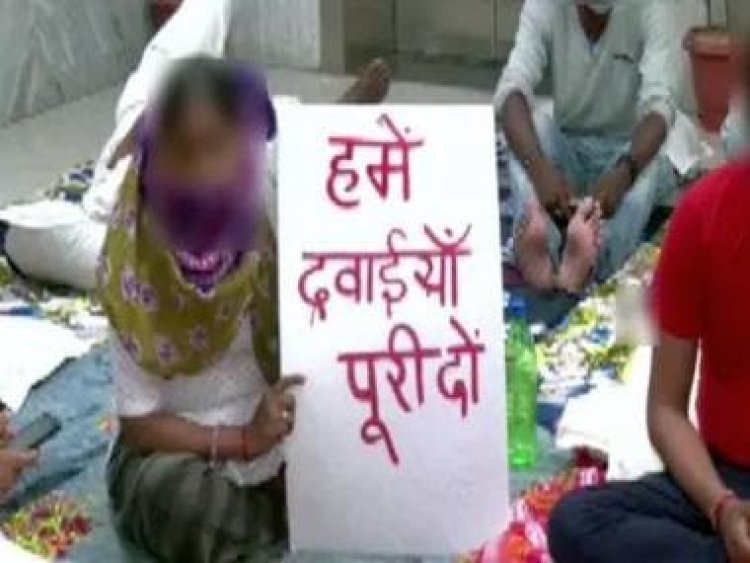Explained: Why are HIV patients protesting in Delhi
Explained: Why are HIV patients protesting in Delhi

“It is criminal to not give someone a drug that can save lives.”
That’s the resounding sentiment of a group of HIV patients who have been protesting outside the National AIDS Control Organisation’s office (NACO) in Delhi since 21 July about the shortages of antiretroviral drugs required for their treatment.
According to the protesters, who have gathered from different parts of Delhi, the shortage of antiretroviral drugs has affected over 50,000 across the country.
Delhi | HIV patients protest outside the National AIDS Control Organization's office in Delhi claiming a shortage of antiretroviral drugs pic.twitter.com/GQpAlV5WjF
— ANI (@ANI) July 26, 2022
“We are not able to access life-saving, crucial drugs that we need to consume regularly for the treatment. For the last five months, the drugs are not available in Delhi as well as neighbouring states,” said Harishankar Singh, a patient while speaking to ANI.
Anitosh, another HIV patient was quoted as saying, “There has been a stockout and shortage of very essential HIV medicines for quite some time. If such a situation persists, how could India achieve its goal to be a completely HIV-free nation by 2030?”
Reason for the protests
The people protesting since 21 July complain that their HIV drugs such as dolutegravir — a relatively new medicine that reduces viral load rapidly — lopinavir and ritonavir — which are used for first and second-line treatment — are in acute shortage and haven’t been available for almost six months.
Pravin Mutyel, director of Snehalaya, an NGO that works for women, children and LGBT communities who have been affected by HIV and AIDS, told The Quint that NACO hasn’t supplied Antiretroviral Therapy (ART) Centres with these medicines for around six months.
In December 2021, NACO, a central government agency that provides medicines, diagnostic kits and training to treat patients infected with the human immunodeficiency virus (HIV), told states to procure the drugs themselves. This came after the central government organisation failed to choose a bidder for purchase orders of life-saving medication.
A source reportedly told Scroll that on June 24 the organisation issued a letter of intent inviting companies to submit details of when drugs could be supplied. Under this process, it may take another two to three months for the supplies to come.
Earlier in June, several states in the North East had also reported that antiretroviral drugs were inaccessible to them. The Manipur State Human Rights Commission also notified that a stock-out had taken place in multiple ART centres.
Why is this a concern?
While there is no cure for HIV, antiretroviral (ARV) drugs taken on time and regularly, can help control it and is considered as one of the few ways to supress the virus.
If left untreated, HIV can progress into acquired immune deficiency syndrome (AIDS), a disease that damages the immune system.
Hence, ARV drugs are critical to patient care; they can indeed be life-saving, or at least life-preserving, for people living with HIV, making access to drugs a fundamental right.
The current shortage is then a crisis that has severely impacted people’s daily work, livelihood, and basic health.
India has 23.19 lakh HIV-infected people in 2020, according to an estimate in the latest NACO report
Scroll reports that several antiretroviral (ART) centres are asking patients to switch to another drug regimen, as crucial HIV drugs have run out of stock in government centres.
For instance, a local ART centre in Imphal is asking a 67-year-old who requires a combination of abacavir, lamivudine, ritonavir, and lopinavir to shift to another combination: tenofovir, lamivudine, and dolutegravir. “They are asking me to take another medicine without assessing whether it will work on me. How can I take it?” he told Scroll.
In centres where the drugs are available, patients are given only three-four doses at once, and are asked to visit the ART centre once every week. "It leads to an increase in travel expenses and is also time-consuming as most of them are daily wage workers,” the protesters noted in a letter.
Also activists note in that many cases, people who work in offices have to lie to go and procure these medicines due to the stigma around HIV. A lot of times, this means people may prefer to opt out of the treatment due to the added cost of travel and logistical hindrances.
Government speaks
Reacting to the shortages and protests, sources from the health ministry said that there is adequate stock nationally for nearly 95 per cent HIV patients in the country, who are on first and second line ARV regimens like tablet TLD (Tenofovir+Lamivudine+Dolutegravir) and other ARV regimens.
“The mainstay of treatment for more than 85 per cent PLHIV is Tablet TLD (a fixed-dose combination of three anti-retroviral drugs — Tenofovir (300mg) + Lamivudine (300mg) + Dolutegravir (50mg)), for which there is sufficient stock nationally to last more than three months,” the source added.
“There is no reported stock out for any ARV drugs at the state level and the fresh supply orders for procurement of the next lot of several drugs are already placed. Individual ART centres may have this issue at times but the medicines are immediately relocated from nearby centres,” added the health ministry source.
With inputs from agencies
Read all the Latest News, Trending News, Cricket News, Bollywood News,
India News and Entertainment News here. Follow us on Facebook, Twitter and Instagram.
What's Your Reaction?

























































